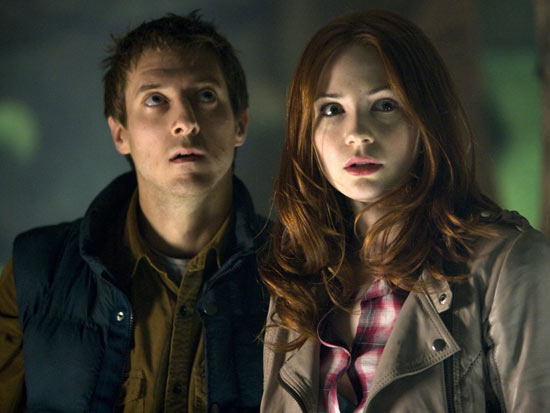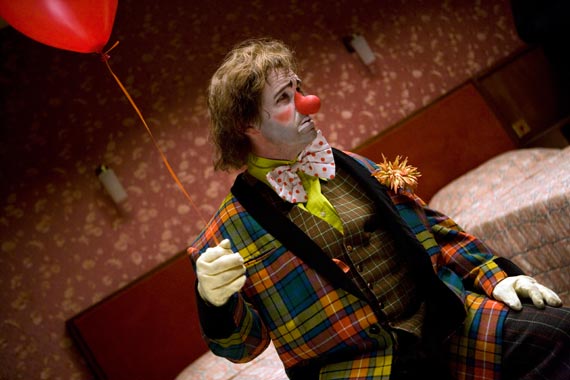By Ricky Young

The last time MostlyFilm talked about Doctor Who, I expressed a hope that the second half of the series would be more fun, less annoying, and feel slightly less like it was heading up its own time-tunnel. Did it succeed? If I were to follow the recent Who template, the answer would have been heralded in the article before last, with tantalising hints spread around the rest of Europe’s Best Website – most of which would turn out to be red herrings – and after I’d spent weeks talking it up as the shiznit, you’d finally read it with a bit of ‘oh, that’s quite clever’ and a bit of ‘yeah, but hang on – is that it?’
So, avoiding all that; it was more fun, it was less annoying, and it looks like the next series will veer away from its own time-tunnel at the last minute. Although if it then crashes headlong into its own time-perineum, it’ll only have itself to blame.
On an episode-by-episode basis, the second half of the series was much stronger than the first, and as the Steven Moffat-era Who is all about the long game, (as opposed to the Davies-era, Tennant-fuelled ‘bigger, louder and *now!*) it made the Spring run look better in reflection. Although nothing can now be done about Hugh Bonneville’s beard. Let’s avoid thinking about it by taking a closer look at each ep.
‘Let’s Kill Hitler’ was a lot of things. As provocative a title as you could ever want, it took one of the most hated, most reviled, most repulsive characters in history, and put her centre-stage. Yes, okay, that’s a bit mean to old Professor River Song, but at this stage of the game if you don’t share Moffat’s devotion to his curly-haired plot-device, then she’s always going to be something of a pain. Love her or hate her, it was clear that while we had been given some answers, she was going to be around until the last few minutes of the series. But what an entrance! (A master of the cold-open, few writers can pack an opening ten minutes with as much verve and excitement as Steven Moffat – ‘The Impossible Astronaut’, ‘Day Of The Moon’, ‘A Good Man Goes To War’ and ‘The Wedding of River Song’ all had cracking starts. He’s so very good at it, unfortunately, that the mid-episode energy-slump has become a matching trait)

Jaunty and confident – a ‘romp’, even, Let’s Kill Hitler booted the River Song story forward, to the relief of everyone, and ended on a sombre note with the Doctor now aware of his impending death. The tone thus set for the rest of the series, with only one thing for sure – unlike the Tenth Doctor when faced with the end, the Eleventh wasn’t going to cry about it.
Up next, and dropping the main plot for a week, was ‘Night Terrors’, in which the Doctor made a house-call to a petrified infant. Reminiscent of the NuWho nadir, ‘Fear Her’, effective production design and a return to one of this season’s less-subtle themes – fathers and sons – meant that despite loose ends and signs of post-production editing, the strong emotional core won the day. However, rumours that Daniel Mays’ mouth may return as next series’ big villain are cruel and unnecessary.

Karen Gillan got her showcase in ‘The Girl Who Waited’, after the occasionally justified stick she got last year for boggling up the screen all the time with her big old ginger face. Trapped in a space-prison that was half Portal, half Blue Peter garden, poor Amy was forced to live alone for thirty-five years while the Doctor and Rory dealt with a tricky bit of timey-wimey, and understandably, she didn’t handle it very well. Either of her. The yearly ‘Doctor-Lite’ episode, not that it was noticeable, got the very best out of the three leads and was pleasingly downbeat – the lesson being that, yes, the monsters might get you, but compared to the fella in the bow tie, they’re not the really dangerous ones.
This was taken further in ‘The God Complex’, set in a mysterious hotel where your worst fears lurked behind anonymous doors. From the design down to the premise, there wasn’t anything in this show that hadn’t been done or seen before, but it was shot, edited and cast so well that it lingered in the mind long after it ended – with the Doctor and his companions agreeing that things might be safer if they got dropped off at home.
If the unstoppable forces of time and the universe had told you that tomorrow was the day you were going to die, would you go and visit James Corden? I might, you know; he seems like he’s calmed down a lot recently. Anyway, ‘Closing Time’ was a sequel to last year’s unsung gem ‘The Lodger’, and set the Doc, Corden’s Craig Owens and his baby son, Stormageddon, against a rather fey but still dangerous little clutch of Cybermen. NuWho has never really known what to do with the big tin goons, but that’s fine – later OldWho didn’t either, for much of the time. Smith and Corden play off each other like troupers and it’s as near to pure sitcom as Who has ever got.
Here’s where we stop, once more, to give props, tribute, or even ‘speck – if you will – to Matt Smith as the Doctor. I’d happily boost my word-count by riffing on about how much he’s brought to the role and how, for me and others of my type, he’s now the definitive portrayal. But if you’ve seen an episode, you know that already.
The episode wrapped up after the day had been won thanks to the power of, again, father-son love (Is it a surprise that Moffat has young sons? Why, not at all!) and the coda featured the Frizzy Führer herself, River Song, being strapped into her astronaut get-up and sent off to blast some tweed.
And to the finale, where the story of the Doctor’s death came to as satisfying a conclusion as one could hope, given all the misdirection and portentousness. Being used to wham-bang Davies-style finales where everything in the universe is at stake until it suddenly isn’t, that the universe was at stake this time felt justified due to the considerable build-up and Matt Smith’s astonishing performance. After a bravura first twenty minutes, where the Doctor moseyed around the universe looking like an English card-sharp in a Western movie, setting up his escape mechanism and generally being a tricksy bastard, it was thrilling to watch the show create a vehicle for moving on, rather than blow shit up real good and hit the reset-button. (Although hands up who sighed and rolled their eyes a little when the new set of prophesies came out of nowhere? Who, exactly, is coming out with these things?) So when the universe was saved, with the Doctor having decided that he’s ‘got too big’ and we see how he’s been engineering a way to take a step back from the god-like figure he’s become since 2005, it felt like a blessed relief from the usual bombast and self-deification. I can’t wait to see how Moffat reshapes Doctor Who – it’s not like the premise hasn’t changed considerably in the past, after all.

The media focuses upon Doctor Who like no other show. It’s a children’s programme, it’s on the BBC, it’s a ‘national treasure’ – Britain’s only modern folk hero – so everyone feels they have a stake in it. Some use it for good (I personally love Second-on-Fifth Doctor slash fiction above all else), some for bad – witness the Daily Mail’s bizarre obsession with the programme as some sort of moral corrupter, and its endless attempts to stick the knife in whenever possible (Simple answer to that, though: they’re cunts). The MediaGuardian – utterly devoted to getting telly completely wrong – now has Doctor Who on a mystifying bedside watch – is it too complicated? Is it too scary? Is it going down in the ratings? Does being beaten by Family Fortunes mean the end of civilisation? Or, hey, I’ve got one – get this: ‘Has the Doctor got too big for his re-boots?’ (There you go, MediaGuardian, you can have that for nothing.) What does it all mean?
Not much, of course – it’s only telly, and telly by its nature changes every week. Doctor Who, by turns, has been Hard Sci-Fi, Educational Primer, Paranoid Thriller, Occult Mystery, Glam Romp, Action Potboiler, Gothic Horror, Sly Comedy and more, reflecting the times like few other shows have been able. No wonder Moffat gets publicly exasperated with his press when the constant bleating belies the surest hand on the tiller that the programme’s ever had. Still, the outbursts and spats seem thinner on the ground recently, despite the provocation – perhaps the Doctor’s decision to take a step back and concentrate on what he’s good at is yet another glint off the mirror.
If you want to encourage him (don’t), there’s more from Ricky here and here
I’m so glad you weren’t mean about Karen Gillan. (They hate her over on mumsnet, you know.) Booo to all the meanness about River Song, who was great in the last episode. This bit,
“If the unstoppable forces of time and the universe had told you that tomorrow was the day you were going to die, would you go and visit James Corden? I might, you know; he seems like he’s calmed down a lot recently.”
this bit is you being good.
I will join in the boos for you being mean about River. But the rest of this article is just pure class, especially this bit:
“After a bravura first twenty minutes, where the Doctor moseyed around the universe looking like an English card-sharp in a Western movie, setting up his escape mechanism and generally being a tricksy bastard, it was thrilling to watch the show create a vehicle for moving on, rather than blow shit up real good and hit the reset-button. ”
And the bit where you call the Daily Mail cunts.
Appropriately for a time-travel programme, River Song is the most annoying character in the history of the universe. She got more annoying each time she appeared, which as she was moving in an opposite time stream to the rest of us means that she was working on being less annoying but the effect on us was the other way round.
I never found River Song in the least bit annoying and I thought Alex Kingston played her well as a young old soul.
A great summary of the series. I’m still not seeing what you guys see in Smith as the Doctor, but that didn’t prevent me from enjoying the build up and the end. Good call on the father/son theme.
Another great piece, though you’re far to harsh on River Song. The Girl Who Waited seemed to use the set from The Adventure Game, which was nice.
Oh, man, Amy and Rory (and Amy) fighting off a sentient aspedistra with a cheese roll.. that’s TV gold right there.
<- The picture was included to soothe those still cheering on Lady Blah Blah.
You’re right about Moffat’s touch with a cold open. My favourite one of his outside of Who has to be the start of the final episode of Jekyll. There was a *lot* wrong with that series, but the introduction of Carver was a five-minute slab of laugh-out-loud brilliance.